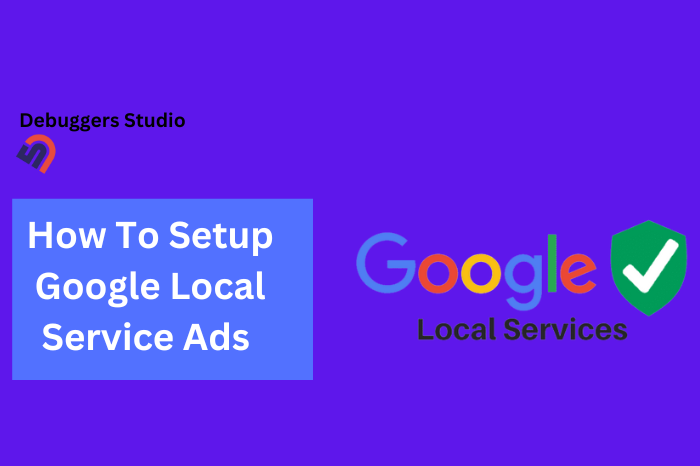Startups are always trying to find ways to grow without spending a lot of money. One way they do this is by using search engine optimization or SEO.
You don’t have to spend a lot of money to use SEO, but when you do it well, it can bring in more people to your website. It can also help with different ways of promoting your business and get organic customers at every step.
This is the perfect resource for individuals seeking to initiate SEO strategies for their startup.
Why Should Startups Invest in SEO?
If you’re uncertain whether SEO is the right fit for your startup consider these three reasons to include SEO into your startup’s plan.
1. Macro Trends That Will Impact Marketing
Google and Millward Brown Digital conducted a investigation in 2014 to understand how B2B decision-makers conduct research and make purchases.
What they found was : 71% of decision-makers start their research with a general query, not a brand-specific one.
In simpler terms, when people want to find things to buy or solve problems, they usually start by searching in a general way instead of just looking for one brand.
That’s why it’s important for new small businesses to consider investing in SEO. It ensures that people can conveniently find them in order to obtain their products or services.
2. People Want to Purchase the Things You are Selling
Even if your product is super specific, there’s probably still someone out there looking for it in some ways.
Example: Someone wants to find a new pair of shoes. They use Google to search for terms like “running shoes for women.” If the person find your website on google 1st page results. The person goes to your website and looks through the different running shoes you have. They find a pair they really like and buy them.
3. Get Free Organic Traffic and Scale It
Search Engine Optimization (SEO) is important for small businesses starting out as it aids in their long-term growth. When a website ranks high in search engine results, it gains trust in potential customers. This trust can attract more people, create more selling opportunities, and ultimately lead to increased revenue.
SEO Trends for Startups in 2024
In the past five years, Google has made some changes to stop people from using black-hat SEO to get their websites to show higher on serps.
Using Black-Hat SEO may give you some short-term benefits, but it won’t last in the long run.
Google made a special guide to help people grow their businesses on Google. It’s called SEO Starter Guide. This guide helps you learn more about SEO (Search Engine Optimization) and how Google works.
Download PDF
Search Engine Optimization Techniques Practiced in Organizations: A Study of Four Organizations (Source)
If companies want to grow and do well for a long time, they should focus on growing naturally. This is especially important for new businesses that want to get bigger and be successful.
1. Semantic Relationships
Semantic relationships are connections between words and concepts that make sense. When you use a search engine like Google, it looks for these connections to give you the best results.
Google uses backlinks to help decide which webpages are the best. Backlinks used to be different, but they still matter a lot. This process is called link-juice. If you have lots of good and trusted webpages linking to your page, it can help your page show up higher in Google.
2. Voice Searches
More and more people are talking to search engines instead of typing. In America, almost 50% of the searches on phones are done by voice recognition. This means it’s really important for new businesses to make sure their websites work well with voice recognition. It’s easy to do this by following some simple search engines guideline .
3. Visual Searches
Google and Pinterest are working together to help people find pictures more easily. Mostly mobile users use Google images on their phones to look for things.
Even stores selling things online are using picture searches to make it easier for people to find what they want to buy.
Now you know about the latest SEO (search engine optimization) trends. In the following section of this article I’ll talk about some tools that startups can use to improve their SEO campaigns.
SEO Toolbox for Startups
SEO tools come in many different types, which can be both good and bad. It can be hard to pick the best one for the job. To help startups improve their marketing strategies, here’s a list of tools they can use for organic campaigns.
SEO Audit Tools for Startups:
SEO audit tools are software that help website owners in identifying and resolving technical and on-page SEO problems. These tools give a detailed report about how the website is doing and help the owner make changes to improve its ranking in serp results.
1. Screaming Frog
Screaming Frog is a widely-used tool for extracting web data and conducting SEO audits. It enables users to explore and gather information from websites, such as data on pages, links, titles, and keywords. Screaming Frog also offers advanced features that can help users in identifying technical SEO problems and enhancing website performance.
2. SEMRush
SEMRush is a well-known tool in the field of digital marketing. It offers various features like analyzing competitors, finding relevant keywords, conducting technical SEO audits, and optimizing content. The Audi tool in SEMrush can find and fix problems on your website to make it work better and show up higher on search engines. That way, people can use your website easier and more people can find it.
3. Google Search Console
Google Search Console tools and reports help you see how many people visit your website from search engines and how well your website is doing.
You can use Search Analytics to find out what words or phrases people are searching for to find your website. You can see how many times your website appeared in search results, how many times people clicked on it, and where it showed up on the list.
You can also make sure your website shows up on Google by submitting a map of all the pages on your website or by submitting individual web addresses. You can also check to see if Google has the most up-to-date information about your website.
Backlink Audit Tools for Startups:
A backlink audit is when you check and analyze the links that point to a website. This helps you see if the links are good quality and relevant to the website. The goal of a backlink audit is to find any harmful or low-quality links that could make the website rank lower in search engines.
1. Backlink Watch
Backlink Watch is a free tool that helps you find links to your new website on the internet. It creates a list of these links and gives details about the text used in them. It also find out if the links are good or bad, and if they might be spam.
2. Majestic SEO
Majestic SEO is a useful tool for startups to improve their search engine optimization. It helps to check the entire website and compare it with competitors. Majestic SEO has its own ways to measure a website’s popularity like Trust Flow and Citation Flow.
Keyword Research Tools for Startups :
Keyword research tools is really important for search engine optimization (SEO) and online marketing. These tools help us find the right keywords and phrases that people use when they search on the internet. By using these keywords effectively, businesses can make their content better and show up more often in search results.
Here are some popular keyword research tools:
1. KWFinder
KWFinder by Mangools is a tool that helps you find and analyze keywords that you can rank for. It gives you lots of details about
- How often people search for certain words
- How much it costs to advertise with those words
- How many other websites are using those words
- With KWFinder, you can find keywords that have a lot of potential
- and learn about your competition, and make your website more visible on search engines.
It’s a free tool that you can start using right away!
2. Ahrefs
Ahrefs has a few tools to help make your website better and show up higher in search results. These tools include finding good keywords, checking backlinks, analyzing the competition, and tracking your rank. Ahrefs is a great tool for finding keywords, but it can be expensive.
3. SEMrush
SEMrush is a tool used in digital marketing to find the best keywords to use. It gives a lot of useful information about how often people search for a keyword, how many other websites are using it, and if it’s getting more or less popular. It has a big collection of information that can help people find good keywords, see how well they’re doing, and improve their SEO strategies.
Competition Analysis Tools for Startups
When starting a business and trying to get noticed online, it’s important to pay attention to other similar businesses that are competing for customers. There are two kinds of competitors: direct competitors who are trying to win over the same customers and make money, and indirect competitors who affect how much money the business can make.
Nowadays, there are tools that can help businesses analyze their competition and see what’s happening in the market.
1. BuzzSumo
BuzzSumo is a tool that helps you keep track of what other people are making and sharing online. It can tell you how long their content is, how many people are linking to it, and what their social media profiles look like. It can also help you keep an eye on important people in your field and give you ideas for your own content.
2. Moz Competition Checker
The Moz tool is very popular for helping websites show up higher in search results. It was made by a person named Rand Fishkin. One of the features in Moz is a tool that helps you see what your competitors are doing. It can tell you about their links, how trustworthy their website is, and where you might be able to get links, too.
How to do SEO for Startups
Here are essential steps to kickstart your startup’s SEO journey effectively:
Set goals and Allocate Resources
SEO helps businesses attract Organic traffic from online searches. But it can be hard to figure out how to reach that goal all at once. Instead, it’s better to break down the bigger goal into smaller steps that lead to success.
For example, if the goal is to have a high ranking for a keyword in six months, start with easy steps and work your way up to the bigger steps.

From the image above you can see, we’ve broken down a complex task (achieving a higher keyword ranking) into smaller, manageable actions, each with a good chance of impacting the overall result.
Resources You will need :
Resources mean expenses, and startups must manage them wisely. While SEO doesn’t require a huge ad budget or very expensive tools, it still has its costs.
To make SEO effective, you’ll need:
- In-dept Research
- Well-optimized content
- Backlinks
- Content marketing
- Tools for tracking and measurement
If you don’t have money to pay someone to help you, you can learn to do things by yourself. It might be difficult, but with the right help, making a plan, and using tools, you can do it.
On-Page SEO for Startups
This article will give you some basic information about on-page SEO for startups. Keep in mind that it’s a big topic and we can’t cover everything in one article.
But we’ll talk about the important on-page SEO factors and give you some tips to make your website more search engine friendly.
Keyword
Using one of the tools mentioned earlier, choose a keyword with moderate difficulty score and high search volume.
Title Tag
For the title of a webpage, it’s important to include the focus keyword so that search engines can find it easily. Putting the keyword at the beginning of the title is even better for optimizing search engine results. The title is usually what shows up on the tab in your internet browser.

URL
Make sure to include the Keyword in the website address. Google’s guide to improving search results says that website addresses should be short and include the keyword. This makes it easier for bots to understand what the website is about.
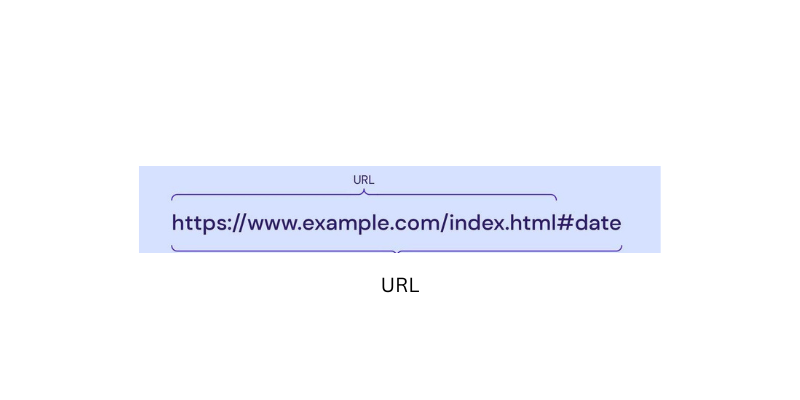
Page Headline
Heading tags in HTML, like <h1>, <h2>, <h3>, <h4>, <h5>, and <h6>, help people and search engines understand what a webpage is about. They can even affect how well a webpage ranks on search engine results pages.
Since they are important for search engine optimization and user experience, it’s important to understand what they are, why they matter, and how to use them correctly for better results. .
It’s important to include the focus keyword in the headline, and placing it near the beginning of the headline can help improve the website’s ranking.
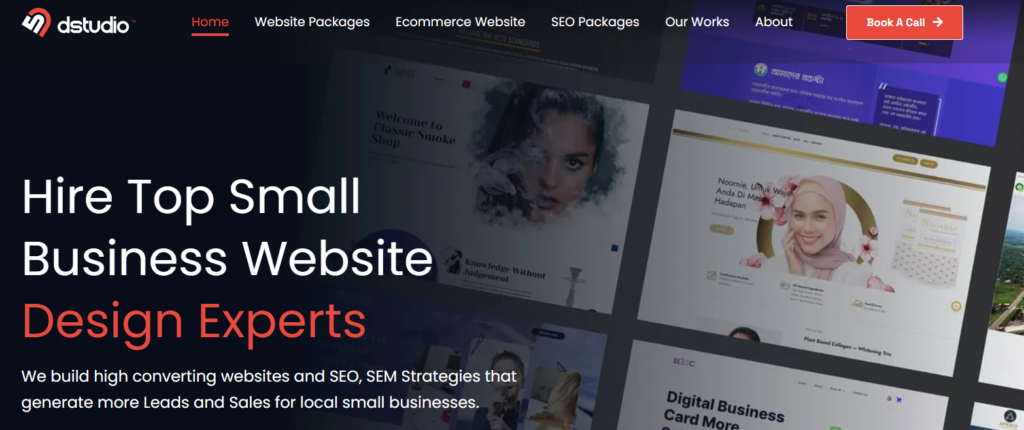
Modifier
Using strong modifiers like ‘best’, ‘top’, ‘inspiring’, ‘guide’, and ‘tutorial’ can make a website’s headline more impactful.
Paragraph Optimization
When starting a website, it’s important to make sure the paragraphs on each page are set up well for search engines. This means Keywords in both the beginning and end of each paragraph, and also remember to use LSI keyword throughout the content. These steps can help your website show up better in online searches.
Multimedia
Adding multimedia, such as videos and pictures, to a webpage helps keep people interested and stay on the page longer. This is especially important for landing pages, which often have big banners and eye-catching images to help visitors understand what the page is about. By making people stay on the page longer, businesses can explain why they are special and persuade visitors to buy from them.
Responsive Design
Responsive design is a way to make sure websites look good and work well on any device, like phones, tablets, or computers. This makes things easier for web designers and developers because they only have to design it once and it will work everywhere. Google uses it as a way to rank websites.
To check if your website is responsive, just follow these steps:
- Open Chrome on your device and press Ctrl+Shift+I to access the Developer Tools.
- Click on “responsive” in the top center and choose the device you want to see how it looks on.
Outbound Links
Including links to other websites on your website pages can make it more valuable to search engines. This is a good way to improve your new website’s use of important keywords.
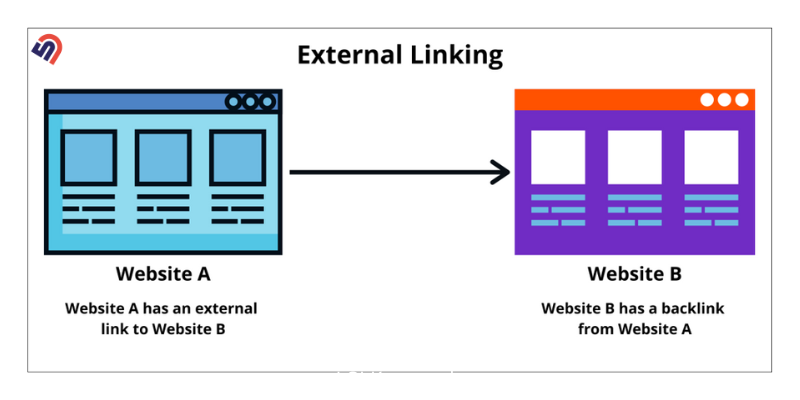
When search engines see that your page links to other websites, they think your page is useful for people and will visit the other websites you linked to. By doing this, they can figure out what kind of content your website has and how good it is.
If you’re not sure whether you’ve added links to a webpage, you can use the Seoquake Chrome extension to check. Just run a test and it will show you all the links on the page.
Internal Links
Internal links on a website work like external links, passing on link juice from one page to another. For the best results, Google suggests using a flat website structure where each page receives equal importance.
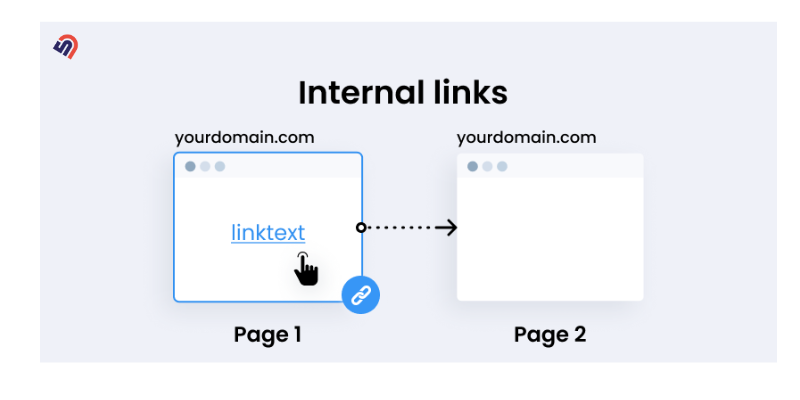
The Moz blog says that it’s best if it only takes three clicks to get to the deepest level of a webpage. Also, it’s better to not have more than 100 links on a page. If you’re unsure if you can link to every page, you can use a “Random posts” section on your website to show different pages to visitors.
Website Speed
A fast website is really important for ranking well on Google. Google recently updated their ranking system to prioritize fast websites even more. Google wants all websites to be super fast and they made a special kind of page called AMP to help with this. Having a fast website is now a really important way to show up high on search results pages.
To check how fast your website loads, you can use Google’s page speed test. Simply enter your website address and click “Test“. The test will give you a score and recommendations on how to make your website load even faster.
LSI Keywords
LSI keywords are words that are similar or alternatives to your main keyword that can help your website rank higher on search engine results. You can find LSI keywords in two ways.
One way is by using Google’s autocomplete feature to find longer variations of your keyword.
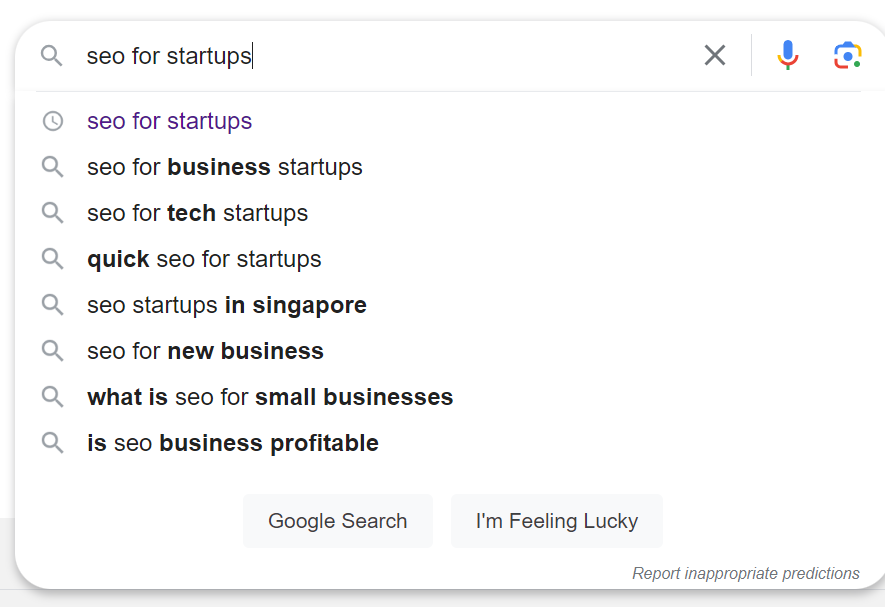
Another way is by looking at the “related searches” section at the bottom of the search results.

Image Optimization
Make sure the pictures on your website are set up in a way that search engines can easily find them. This means giving each picture a name and adding some extra information called a Caption and Alt tag. By using specific words in these areas, you can help your website show up higher in search results for those words.
Long-Form Content
A study by Ahrefs found that the more words a website has, the higher chances tends to rank in search results. They made a graph to show this relationship:

Websites and blogs that have 3000 to 10000 words tend to get shared more on social media. As a result, these websites also do better in search engine rankings.
Here is the proof :
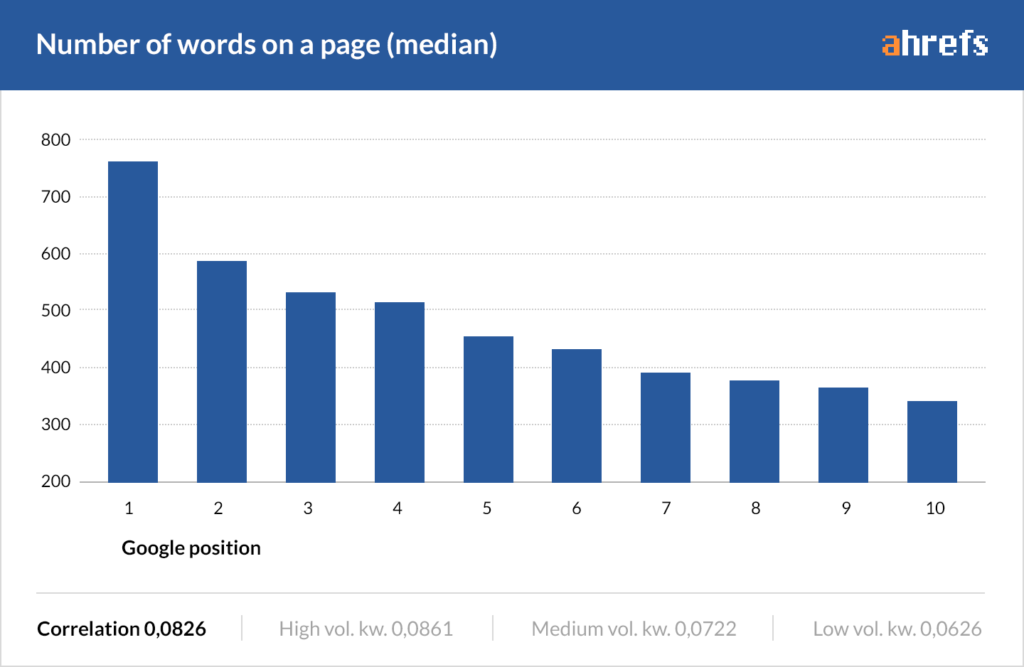
Rich snippets
Google’s results page now has different sections that are important. Some of these sections are rich snippets, knowledge base, and ‘people search for’ sections. the purpose of those section is to give users more information that is related to what they are searching for.

To make your website eligible for rich snippets, include specific code for elements like reviews, prices, articles, product descriptions, and titles on your pages. If you’re using WordPress, you can easily achieve this by installing a rich snippet plugin and then adjusting your content accordingly.
AMP Pages
More and more people are using their phones to search for things they want to buy or use. To make your website better for these mobile users, you can create something called an AMP page.
This kind of page loads really fast and shows the information in a simple way. These things will help your website show up higher on Google and give people a better experience when they visit it.
Monitor Bounce Rate, Average Page Time, & Traffic
Once you have implemented the modifications to your website that we discussed, it is important to closely monitor its performance using Google Analytics.
At first, you might not see big changes, but after about a week, you should begin to notice that the keywords you’re focusing on are showing up more easily in search results.
Website Optimization
Making a website better is really important for getting it seen by more people. This is called website optimization. It helps the website show up higher on search engines and makes it easier for users to navigate.
To optimize a website, you have to do things like make it load faster, make it work well on mobile devices, and make sure it has the right information for search engines to understand.
By doing these things, businesses can get more visitors to their website and keep them interested. Website optimization is something that all businesses need to do to keep up with the changing digital world and be successful.
Off-Page SEO
For startups, off-page SEO doesn’t involve paid activities like PPC. Some common off-page strategies include building links, promoting the brand, and participating in online forums.
Dofollow & Nofollow
When one website gives a “dofollow” link to another website, it means that the first website supports the content on the second website.
Example of dofollow : <a href=”https://debuggersstudio.c0m/”>Startup tool kit</a>
Nofollow links are not helpful to the website they are linked to. This could mean that the website linking to it doesn’t believe it’s reliable, or they were paid to do it. Google suggests that websites use nofollow links for websites that might not be trustworthy.
Example of nofollow : <a rel=”nofollow” href=”https://debuggersstudio.c0m/“>Startup tool kit</a>
Guest Post
A Guest Post is an article that is written and published on another person’s blog. When you write something on your own blog, it’s simply called a “post,” but when it is published on someone else’s blog, the writer is considered a ‘guest’.
There are 3 types of guest post:
Free Guest Post : When you write a post for free on a website that doesn’t have much popularity (usually ranked between 10 and 30), it may include a link that can help boost your own website’s traffic.
Paid Guest post : Paid guest posts are often published on popular and reputable websites with high traffic and authority, typically ranking between DA 40 and 90. The cost of publishing a paid guest post can vary greatly, ranging from $50 to $5000 or more.
Cross Guest Post : Cross guest posting opportunities occur when two websites agree to exchange a guest post. These websites typically have similar levels of domain authority and web traffic. The decision to cross-post is usually made through mutual agreement between the two sites.
Guest Posting Template :

Source : NinjaOutreach
Build Brand Authority
If you’re just starting out with your own business, it’s important to establish yourself as a respected and knowledgeable brand in your field. One way to get started is by connecting with people who are influential in your industry and sharing your ideas on their blogs.
This helps more people learn about your brand and what you have to offer. Over time, your brand will become more well-known and you’ll become more influential in your niche. Plus, since you’re posting content on highly-regarded websites, it can also improve your search engine rankings.
Use Q&A Websites
A good way to make people trust and know your brand is by answering questions on Quora and Reddit. Find topics that are related to your brand and start answering questions. After you answer, add a link so that people can visit your official website.
Get Links from .edu and .gov Websites
A case study from last year talked about how 10Beasts, a website that sells products through affiliate marketing, became successful by getting links from educational websites. These links helped 10Beasts get top reviews and show up first in search results for difficult keywords. To get more links, the company started a scholarship and asked community colleges in the USA to add it to their scholarship pages. This made 10Beasts’ website more popular and helped it show up higher in search results.
Looking for .edu backlinks? Try these search methods with your chosen keyword: –
Type “site:.edu” before your keyword to find relevant pages on educational institution websites.
– Add “+ resources” after your keyword to search for pages on these sites that offer helpful resources.
– Try adding “inurl:links” after your keyword to find pages on .edu websites that link to other sites.
– Lastly, try adding “+ other sites” after your keyword to find external websites that .edu pages link to.
Steal Competitors Backlinks
Did you know that you can take your competitors’ backlinks or get links from the same place they get them to improve your search engine ranking? You can use a tool to check your competitors’ backlinks and find high-quality websites with a good reputation. Then, you can add your own link to those websites to increase your own website’s credibility. You can add your link through a guest post, link placement, or brand mention.
Repair Broken Links
Broken links are a common occurrence and not something to be too worried about. The solution is simple: either fix or replace the broken links. To avoid any problems, it’s important to regularly check for broken links and take appropriate action to fix them.
Create Keyword Optimized YouTube Videos
A helpful activity to improve your online presence is making videos that relate to important topics and Keywords. When you’re ready to share them, write descriptions that use those important keywords and include links to your web pages.
To improve your chances of being found on YouTube, you can research keywords that people are searching for. For example, if you’re promoting a startup, you might search for “startup marketing” to find useful keywords.

Promote on Pinterest
Pinterest is important for helping startup websites perform better in visual searches. To do this, you should promote your posts on Pinterest so that they appear in Google image results. This is how you can get more traffic from Pinterest.
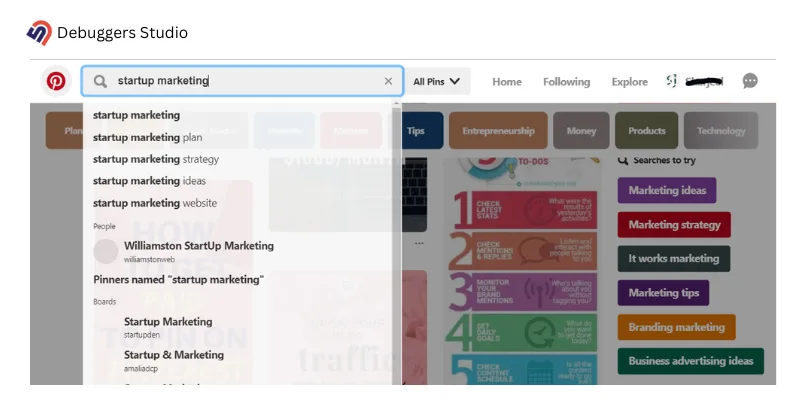
When someone looks for pictures on Google, then goes to Pinterest for more image options, they may eventually come across your website.
Conversion Rate Optimization (CRO) for startups
Conversion rate optimization (CRO) is the process of increasing the number of people who do what you want them to do on your website, like buying something, signing up for a newsletter, or getting a white paper. This is really important for startups, because they usually don’t have a lot of money, so they have to make the most out of every person who visits their site.
Here are some tips to help startups optimize their CRO:
Understand your target audience
Figure out what your visitors want and what problems they have. When people come to your site, what are they looking for? The better you understand your audience, the better you can make content and experiences that they’ll like.
Set Clear Goals
Decide what you want people to do when they come to your site. Do you want them to buy something, sign up for a newsletter, or get a white paper? Once you know what you want, you can make changes to your site to help you reach those goals.
Use Data to Find Areas to Improve
There are tools and websites that can help you see how well your site is doing and find areas where you can make it better. For example, you can use Google Analytics to see how many people are buying things or leaving your site without doing anything.
Make small changes and see what happens
Once you find areas to improve, make small changes to your site and see if they make a difference. This way, you can figure out what works and what doesn’t without messing up your whole site.
A/B Testing
Compare different versions of your site. A/B testing is a way to see which version of your site is better. You can try different headlines, buttons, or descriptions and see which ones get more people to do what you want.
Keep an eye on your results and make changes as needed. CRO is an ongoing process, so you need to keep checking how well your site is doing and make changes if you need to.
FAQ
Is SEO free or paid?
SEO is a combination of free and paid methods. One of the free methods is called organic SEO. This involves improving your website’s content and structure to rank higher on search engines. On the other hand, some SEO practices like pay-per-click advertising and hiring SEO experts require payment. Depending on your goals and budget, you can choose between free or paid strategies.
What type of SEO is best?
The most effective way to make your website visible on search engines is by practicing “White-Hat SEO.” This type of SEO follows ethical guidelines and is focused on creating valuable and high-quality content, enhancing website design, and earning backlinks naturally. White-Hat SEO aims for long-term and sustainable results, rather than using dishonest tactics to manipulate search engine rankings.
What are the 3 levels of SEO?
The three levels of SEO are:
1. On-Page SEO
2. Off-Page SEO
3. Technical SEO
Is SEO better than Google ads?
The choice between SEO (Search Engine Optimization) and Google Ads depends on your goals and budget. SEO offers sustainable, long-term visibility in organic search results but takes time to see results. Google Ads provides immediate visibility through paid advertising but requires ongoing spending.
Which keyword is best for SEO?
The best keywords for SEO are those that are relevant to your content, have high search volume, and low competition. Long-tail keywords, specific to your niche, often perform well in attracting targeted traffic. Conduct keyword research to find the best ones for your website.


